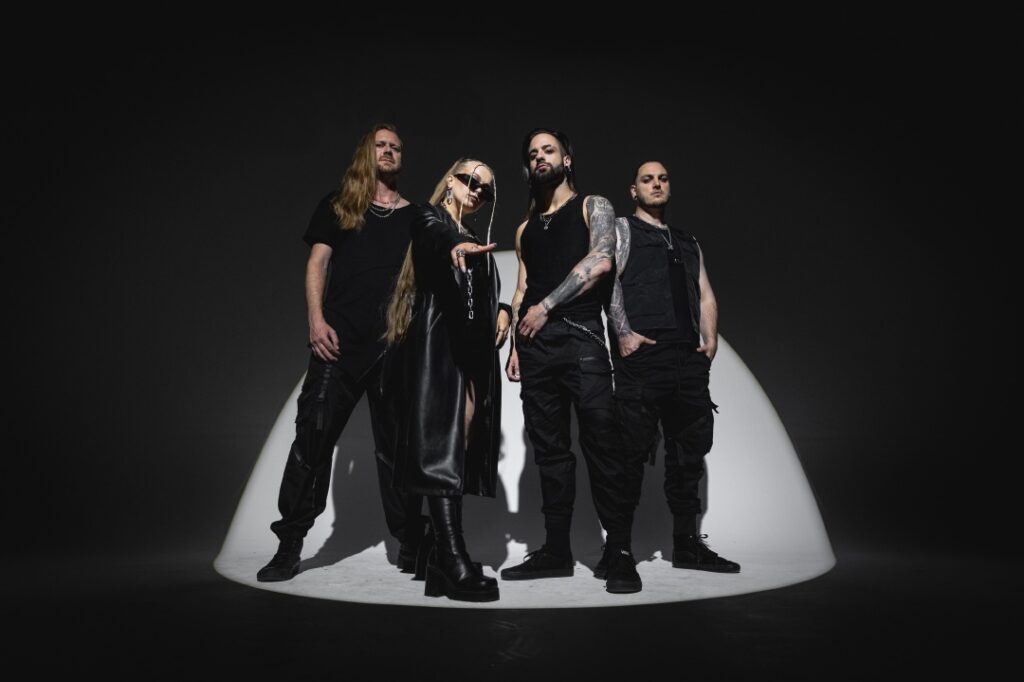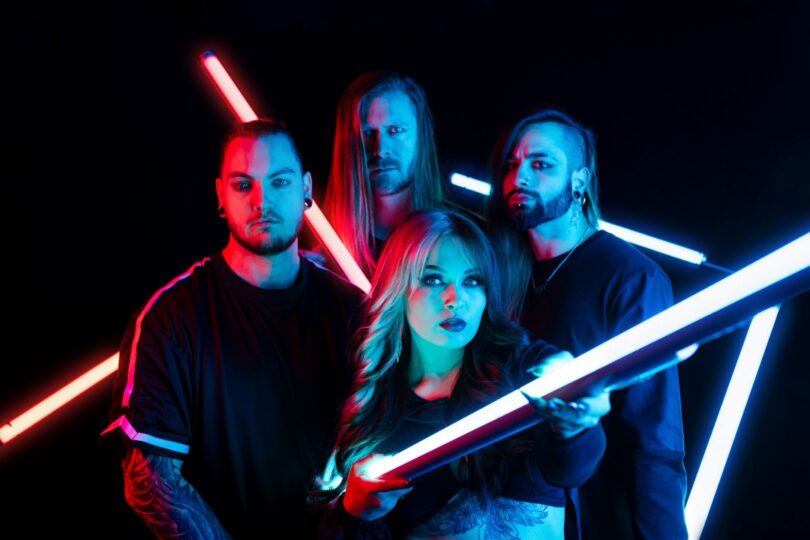In the ever-evolving landscape of modern metal, Enemy Inside have carved out a space that’s entirely their own. With the release of their latest album “Venom“, the German band takes a bold step forward, blending ferocious breakdowns, haunting melodies, industrial textures, and cinematic flair into a sound that’s as emotionally raw as it is sonically powerful. We had the chance to catch up with the band to talk about their creative process, the personal stories behind the songs, and what fans can expect from this electrifying new chapter. From vulnerability to venom, this is Enemy Inside like you’ve never heard them before.
- Hello, welcome on Heavyworlds.com, it’s a pleasure to have you here. “Venom” seems to be your most authentic and evolved work to date. Given that you’ve blended elements of metalcore, industrial, pop, and modern rock, how did you approach the songwriting process differently this time? Did you consciously decide to incorporate heavier breakdowns and harsh vocals from the beginning, or did that direction develop naturally as you worked on the tracks?
We didn’t set any boundaries for ourselves when writing Venom. The idea was to just let things flow naturally and not overthink whether a certain sound or element fit into a specific genre. The heavier breakdowns and harsher vocals came out organically as part of that process. We wanted to explore both the heaviest and the softest sides of our sound, and that freedom really shaped the album. It was probably the most fun and liberating writing process we’ve had so far.
- One of the strongest themes in this album seems to be evolution, not just in terms of your
sound but also in how you express emotions and experiences through your music. What kind of personal or artistic growth did you go through while creating “Venom”? Were there any particular challenges or breakthroughs that shaped the way this album came together?
Creating Venom was a very liberating experience for us. We gave ourselves total freedom to try new things, both musically and emotionally. I explored so many different facets of my voice, from rap to screams to whistle notes, which I hadn’t really done on that level before. The biggest growth was probably letting go of expectations and just doing what felt right. Some songs were more challenging to write emotionally, but those are also the ones I’m most proud of.
- The title track “Venom” sets the tone for the album with a high-energy and intense sound. The word “Venom” often symbolizes toxicity, betrayal, or internal struggle. Can you share more about the inspiration behind this track? Does it represent a central theme throughout the album, or is it more of a standalone statement?
The title track definitely reflects the overall theme of the album. “Venom” is about confronting
the things that poison you from the inside out, whether that’s a person, a mindset, or something deeper. It captures that moment of rage and release, and sets the tone for the rest of the record. It’s not just a standalone, it really embodies the spirit of what the album is about: breaking free and reclaiming your strength. - One of the standout tracks, “Sayonara”, incorporates elements inspired by Japanese
culture. What specifically drew you to these influences, and how do they connect to the
song’s message or themes? Does the track tell a specific story, or is it more of an emotional
or metaphorical representation?
“Sayonara” was inspired by the way people interact online, especially the amount of hate and negativity you sometimes get as an artist, or really, just as a person on the internet. The Japanese elements came into play as the song evolved. I started experimenting with different languages in the lyrics, and that really shaped the atmosphere of the track. The title “Sayonara” felt like the perfect sarcastic goodbye to all that online toxicity. From there, the Anime-inspired aesthetic developed naturally, both musically and visually. - There’s a noticeable shift towards a more modern and electronic-influenced sound in songs like “Sayonara” and “Fuck That Party”, while still keeping your signature melodic elements. What inspired this sonic direction, and how did you approach blending these electronic textures with your heavier side?
We’ve always loved experimenting with different sounds, and we didn’t want to stick to just one direction. On Venom, we really embraced the idea of contrast, combining the rawness of metal with electronic elements, catchy melodies, or even pop structures. It was all about what felt right for each song, and the blend just happened naturally. We didn’t hold ourselves back or try to follow any rules, which made it a very creative process.
- Many of the songs on Venom explore strong emotions, inner conflicts, and personal struggles. Is there a specific track on the album that you feel represents you the most on a personal level? If so, what is the story behind it?
“Don’t Call Me An Angel” is definitely the most personal track on the album. It came from a very vulnerable place, and it was one of the hardest to write because of how emotionally raw it is. It talks about a time in my life when I was really struggling internally, and putting that into words and sharing it was difficult, but also incredibly healing. It’s a song that really shows my softer, more honest side.
- You’ve worked with notable artists such as Zak Tell from Clawfinger, Mirza Radonjica from Siamese, and Davey Suicide on this album. When collaborating with other musicians, how do you ensure that their contribution fits seamlessly into your artistic vision? Were there any unexpected moments or creative ideas that came from these collaborations that surprised you?
All three collaborations came together very naturally. We chose each artist because we truly believed they would elevate the song, and they all brought something unique to the table. Zak Tell was perfect for “Fuck That Party”, he has this iconic energy that matched the attitude of the track. Mirza added so much emotion and depth, and Davey brought a darker, edgy vibe. What surprised us most was how effortlessly their parts blended with ours. It didn’t feel forced, it just clicked.
- Evan K played a major role in producing Venom, while Christoph Wieczorek handled the mixing and mastering. Since Evan K is already an integral part of the band, how did having him as a producer influence the creative freedom and direction of the album? How did Christoph Wieczorek’s work shape the final sound, and were there any specific elements he enhanced that you hadn’t initially expected?
Having Evan as both guitarist and producer gave us a lot of flexibility and control over the creative process. It meant we could try things out instantly and follow through on ideas without delay. Christoph’s mixing and mastering took everything to the next level, he really brought out the clarity, heaviness, and punch in the sound. One thing he really helped enhance was the balance between all the electronic layers and the raw, heavy parts, it all came together so seamlessly thanks to him. - Looking at your discography from “Phoenix” to “Venom”, there’s been a clear evolution in both sound and intensity. With Venom, do you feel that you’ve reached the most authentic representation of what Enemy Inside is, or do you see this as another stepping stone toward something even greater?
Venom is definitely our most authentic work so far, it feels like we’ve really found our voice. But at the same time, we see it as part of a larger journey. We’re constantly evolving, and we don’t want to create the same album twice. This record reflects where we are right now, but we’re always looking ahead, and there’s still so much we want to explore.
- With heavier breakdowns, more aggressive vocals, and intricate instrumentals, Venom feels like an album designed for high-energy live performances. Do you think this will influence how your future concerts feel compared to previous tours? Should fans expect an even more intense stage presence?
Absolutely! Many of the new songs were written with the live stage in mind. Tracks like “Venom” or “Sayonara” bring a whole new level of energy that really translates well in a live setting. Our shows are going to be even more intense and immersive, we want fans to feel every bit of what they hear. So yes, they can definitely expect a next-level live experience!
- With Venom set for release on February 28 (the interview was sent before the release date) , what are your touring plans? You’re currently on tour, right? Are fans getting the chance to hear some of the new songs live, and how has the response been so far?
We’ve just wrapped up most of our European tour, and the response to the new material has
been incredible. Fans really connected with the songs live, especially tracks like “Sayonara”
and “Fuck That Party.”
- Many fans feel that live performances are where a band’s true energy is revealed. When
preparing for a tour, what aspects of your performance do you focus on the most? Do you
prioritize stage presence, setlist flow, or finding ways to connect with the audience on a
deeper level?
Connecting with the audience is always our top priority. Of course, we also focus on creating
a cohesive setlist and delivering a strong visual experience, but in the end, it’s all about the energy and emotion in the room. We want the crowd to feel like they’re part of something, not just watching a show, but truly experiencing it with us. - The music industry has changed drastically in the past decade, especially for rock and
metal bands. Streaming, social media, and the way fans interact with music have all
evolved. How has Enemy Inside adapted to these changes, and do you feel that these new
platforms have helped or challenged the way you connect with your audience?
We’ve really embraced the digital age, especially platforms like Spotify, YouTube, and social media. These tools have helped us reach a much broader audience, fans from all over the world can discover us now. It definitely comes with its challenges, but overall, we see it as an opportunity to connect more directly and personally with our community. - Enemy Inside has built a dedicated fan base since its formation in 2017. How has your interaction with fans influenced the music you write? Do you ever take inspiration from the emotions or messages they share with you, and if so, can you recall any specific moments where fan interactions played a role in shaping a song or a lyrical theme?
Absolutely, some of the most touching moments are when fans share personal stories with
us about how our music helped them through tough times. While we don’t write songs based
on specific messages, those interactions definitely stay with us and inspire us to be honest
in our lyrics. It reminds us that music can truly make a difference, and that connection fuels
everything we do. - That was the last question. Thank you for your time. Is there anything you would like to say
to your fans or Heavyworlds readers?
Thank you so much to everyone who came out to see us on this tour, we’re incredibly
grateful for your support and energy. As we’re reaching the end of this amazing chapter,
we’re super curious to hear what you all think of Venom. We put our hearts into this album,
and we hope it connects with you the way it does with us. Stay tuned, there’s more to
come!

[ITA]
- Ciao, benvenuti su Heavyworlds.com, è un piacere avervi qui. “Venom” sembra essere il vostro lavoro più autentico ed evoluto fino ad oggi. Considerando che avete mescolato elementi di metalcore, industrial, pop e rock moderno, come avete affrontato il processo di scrittura questa volta? Avete deciso consapevolmente fin dall’inizio di incorporare breakdown più pesanti e voci scream, oppure quella direzione si è sviluppata in modo naturale durante la lavorazione dei brani?
Non ci siamo posti alcun limite mentre scrivevamo “Venom“. L’idea era semplicemente lasciar fluire le cose in modo naturale, senza pensare troppo se un determinato suono o elemento si adattasse a un genere specifico. I breakdown più pesanti e le voci scream sono venuti fuori in modo organico, parte integrante di questo processo. Volevamo esplorare sia il lato più duro che quello più dolce del nostro sound, e quella libertà ha davvero plasmato l’album. È stato probabilmente il processo di scrittura più divertente e liberatorio che abbiamo mai vissuto.
- Uno dei temi più forti dell’album sembra essere l’evoluzione, non solo nel suono, ma anche nel modo in cui esprimete emozioni ed esperienze attraverso la musica. Che tipo di crescita personale o artistica avete vissuto creando Venom? Ci sono state sfide o momenti di svolta particolari che hanno influenzato la realizzazione dell’album?
Creare Venom è stata un’esperienza molto liberatoria. Ci siamo concessi totale libertà, sia a livello musicale che emotivo. Ho esplorato moltissime sfaccettature della mia voce, dal rap agli scream fino ai toni in falsetto, cosa che non avevo mai fatto a questo livello. La crescita più grande è stata probabilmente quella di lasciar andare ogni aspettativa e fare semplicemente ciò che sentivamo giusto. Alcuni brani sono stati più difficili da scrivere a livello emotivo, ma sono anche quelli di cui vado più fiera.
- La title track “Venom” dà il tono all’album con un sound energico e intenso. La parola “Venom” spesso simboleggia tossicità, tradimento o conflitto interiore. Puoi raccontarci di più sull’ispirazione dietro questo brano? Rappresenta un tema centrale dell’album, o è più un’affermazione indipendente?
La title track riflette sicuramente il tema generale dell’album.“Venom” parla dell’affrontare tutto ciò che ti avvelena dall’interno, che si tratti di una persona, un pensiero, o qualcosa di più profondo. Cattura quel momento di rabbia e liberazione, e imposta il tono per il resto del disco. Non è solo un pezzo a sé, incarna davvero lo spirito dell’album: liberarsi e reclamare la propria forza.
- Uno dei brani più particolari, “Sayonara”, incorpora elementi ispirati alla cultura giapponese.
Cosa vi ha attratti in queste influenze e come si legano al messaggio del brano? Racconta una storia specifica, o è più una rappresentazione emotiva o metaforica?
“Sayonara” è ispirato all’interazione online, in particolare all’odio e alla negatività che spesso si ricevono, sia come artisti sia semplicemente come persone su internet. Gli elementi giapponesi si sono sviluppati man mano che evolveva il pezzo. Ho iniziato a sperimentare con lingue diverse nei testi, e questo ha definito molto l’atmosfera del brano. Il titolo “Sayonara” è un addio sarcastico a tutta quella tossicità online. Da lì è nata anche l’estetica ispirata agli anime, sia a livello musicale che visivo.
- C’è un’evidente svolta verso suoni più moderni ed elettronici in brani come “Sayonara” e “Fuck That Party”, pur mantenendo le vostre melodie caratteristiche. Cosa ha ispirato questa direzione sonora, e come avete fuso questi elementi elettronici con il vostro lato più pesante?
Abbiamo sempre amato sperimentare con suoni diversi e non volevamo limitarci a una sola direzione. In Venom, abbiamo abbracciato davvero l’idea del contrasto, combinando la crudezza del metal con elementi elettronici, melodie o anche strutture pop. Tutto è stato guidato da ciò che sentivamo giusto per ogni brano, e la fusione è avvenuta in modo naturale. Non ci siamo imposti regole, ed è stato un processo molto creativo.
- Molti brani di Venom esplorano emozioni forti, conflitti interiori e lotte personali.
C’è un brano in particolare che ti rappresenta più degli altri a livello personale? Se sì, qual è la sua storia?
“Don’t Call Me An Angel” è sicuramente il brano più personale dell’album. È nato da un momento molto vulnerabile, ed è stato uno dei più difficili da scrivere per quanto è emotivamente crudo. Parla di un periodo in cui stavo davvero lottando interiormente, e metterlo in parole e condividerlo è stato difficile ma anche incredibilmente terapeutico. È un brano che mostra il mio lato più dolce e onesto.
- Avete collaborato con artisti noti come Zak Tell (Clawfinger), Mirza Radonjica (Siamese) e Davey Suicide. Quando lavorate con altri musicisti, come fate a far sì che il loro contributo si integri perfettamente con la vostra visione artistica? Ci sono stati momenti o idee inaspettate che vi hanno sorpreso?
Tutte e tre le collaborazioni sono nate in modo molto naturale. Abbiamo scelto ogni artista perché credevamo davvero che potessero elevare il brano, e ognuno ha portato qualcosa di unico. Zak Tell era perfetto per “Fuck That Party”, ha un’energia iconica che si adattava perfettamente all’attitudine del pezzo. Mirza ha aggiunto molta emozione e profondità, e Davey un tocco più oscuro e graffiante. Ci ha sorpresi quanto facilmente le loro parti si siano fuse con le nostre. Non è stato forzato, ha funzionato da subito.
- Evan K ha avuto un ruolo importante nella produzione di Venom, mentre Christoph Wieczorek si è occupato di mix e master. Dal momento che Evan è già parte integrante della band, in che modo il suo ruolo di produttore ha influenzato la libertà creativa e la direzione dell’album? E come ha contribuito Christoph al suono finale?
Avere Evan sia come chitarrista che come produttore ci ha dato molta flessibilità. Potevamo provare idee in tempo reale, senza perdite di tempo. Il lavoro di Christoph ha portato tutto a un livello superiore: ha davvero valorizzato chiarezza, potenza e impatto del sound. Una cosa in particolare che ha migliorato è stato l’equilibrio tra gli strati elettronici e le parti più grezze e pesanti: tutto si è fuso alla perfezione grazie a lui.
- Guardando alla vostra discografia da Phoenix a Venom, c’è stata un’evoluzione evidente nel suono e nell’intensità. Con Venom, pensate di aver raggiunto la rappresentazione più autentica di ciò che è Enemy Inside, o è un altro passo verso qualcosa di ancora più grande?
Venom è sicuramente il nostro lavoro più autentico finora. Sentiamo di aver davvero trovato la nostra voce. Ma allo stesso tempo, lo vediamo come parte di un percorso più ampio. Siamo in continua evoluzione e non vogliamo fare due volte lo stesso album. Questo disco riflette dove siamo ora, ma guardiamo sempre avanti: abbiamo ancora tanto da esplorare.
- Con breakdown più pesanti, voci più aggressive e arrangiamenti intricati, Venom sembra progettato per performance live ad alta energia. Pensate che questo influenzerà il modo in cui saranno i vostri concerti futuri rispetto ai tour precedenti? I fan devono aspettarsi una presenza scenica ancora più intensa?
Assolutamente! Molti dei nuovi brani sono stati scritti pensando proprio al palco. Tracce come “Venom” o “Sayonara” portano un’energia completamente nuova, che funziona alla grande dal vivo. I nostri show saranno ancora più intensi e immersivi, vogliamo che i fan sentano ogni nota. Possono sicuramente aspettarsi un’esperienza live di un altro livello!
- Con Venom in uscita il 28 febbraio (intervista inviata prima della data), quali sono i vostri piani per il tour? Siete attualmente in tour, giusto? I fan hanno avuto occasione di ascoltare i nuovi brani dal vivo, e com’è stata la risposta?
Abbiamo appena concluso la maggior parte del tour europeo, e la risposta al nuovo materiale è stata incredibile. I fan si sono davvero connessi ai brani dal vivo, soprattutto con pezzi come “Sayonara” e “Fuck That Party”.
- Molti fan pensano che i live siano dove una band mostra la sua vera energia. Quando vi preparate per un tour, su cosa vi concentrate di più? Date priorità alla presenza scenica, al flusso della scaletta o al modo di connettervi profondamente con il pubblico?
Connetterci con il pubblico è sempre la nostra priorità assoluta. Ovviamente ci concentriamo anche sulla scaletta e sull’esperienza visiva, ma alla fine tutto si basa sull’energia e l’emozione che si crea nella sala. Vogliamo che il pubblico si senta parte di qualcosa, non solo spettatore, ma protagonista insieme a noi.
- L’industria musicale è cambiata molto nell’ultimo decennio, soprattutto per le band rock e metal.
Streaming, social media e il modo in cui i fan interagiscono con la musica si sono evoluti. Come si è adattata Enemy Inside a questi cambiamenti? Pensate che queste nuove piattaforme abbiano aiutato o complicato il modo in cui vi connettete con i fan?
Abbiamo abbracciato l’era digitale, soprattutto piattaforme come Spotify, YouTube e i social. Questi strumenti ci hanno permesso di raggiungere un pubblico molto più ampio: ora i fan ci scoprono da ogni parte del mondo. Ha sicuramente le sue sfide, ma nel complesso lo vediamo come un’opportunità per connetterci in modo più diretto e personale con la nostra community.
- Enemy Inside ha costruito una fanbase affezionata dal 2017. In che modo l’interazione con i fan ha influenzato la vostra musica? Vi capita di trarre ispirazione dalle emozioni o dai messaggi che vi condividono? Ricordate episodi in cui l’interazione con i fan ha influenzato un brano o un tema?
Assolutamente, alcuni dei momenti più toccanti sono quando i fan ci raccontano come la nostra musica li ha aiutati nei momenti difficili. Anche se non scriviamo brani basandoci su messaggi specifici, queste interazioni restano con noi e ci ispirano a essere onesti nei testi. Ci ricordano che la musica può davvero fare la differenza, ed è quella connessione che alimenta tutto ciò che facciamo.
- Questa era l’ultima domanda. Grazie per il vostro tempo. Volete dire qualcosa ai vostri fan o ai lettori di Heavyworlds?
Grazie di cuore a tutti quelli che sono venuti a vederci in tour, siamo incredibilmente grati per il vostro supporto e la vostra energia. Ora che stiamo per chiudere questo bellissimo capitolo, siamo super curiosi di sapere cosa pensate di Venom. Abbiamo messo il cuore in questo album, e speriamo che vi tocchi come ha toccato noi. Restate connessi, il meglio deve ancora venire!







